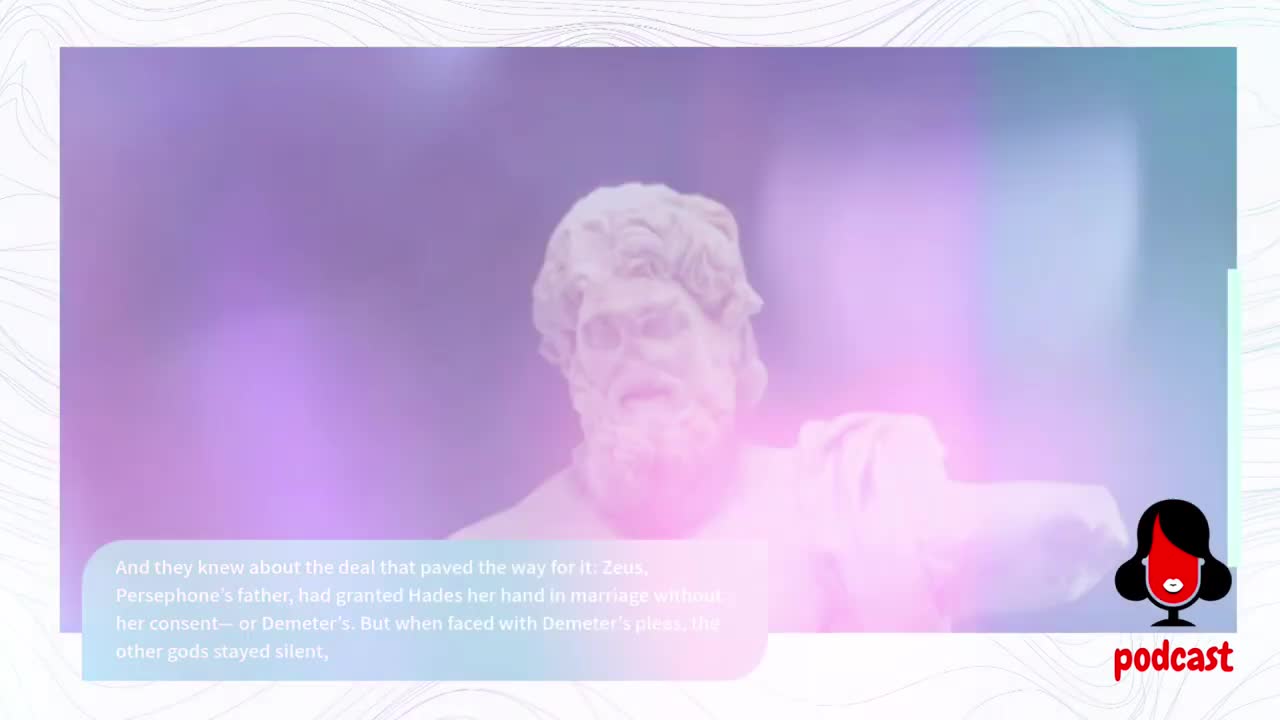Premium Only Content

The myth of Hades and Persephone
Every year before the ancient Greeks sowed their seeds of grain, they celebrated Demeter, the goddess of agriculture. On Earth, each morsel of food was sweet sustenance, while in the land of the dead, it ensured a permanent stay. Demeter tended to Earth’s fields with her beloved daughter, Persephone, who inherited her mother’s passions and grew into a bright young woman. But all the while, a shadowy figure watched from below.
One day, Persephone was frolicking in a meadow with a freshwater nymph, Cyane. As they admired a blooming narcissus flower, they noticed it tremble in the ground. Suddenly, the earth split, and a terrifying figure arose. It was Hades, god of the dead and the underworld. He wrenched Persephone from Cyane, dragged her into his inky chariot, and blasted back through the earth.
Cyane wept so hard she dissolved, becoming one with the river. By the time Demeter arrived at the scene of the abduction, the crater in the meadow had closed— and Cyane and Persephone had vanished.
Demeter sped to Mount Olympus for help. Many of the gods had witnessed the scene. And they knew about the deal that paved the way for it: Zeus, Persephone’s father, had granted Hades her hand in marriage without her consent— or Demeter’s. But when faced with Demeter’s pleas, the other gods stayed silent,
So, she searched alone. In her grief and desperation, she neglected her usual tasks. Crops withered, and a great famine plagued the Earth. As mortals began to perish, the gods grew wary. Who would worship them and offer tributes if the humans disappeared? So, Zeus ordered Demeter to stop her crusade and returned to her duties. But she refused.
Deep below, across the frigid river Styx, and through the halls of the underworld, Persephone was waging her own protest. Hades expected her to serve as his wife and queen. But Persephone rebuffed the god’s advances and refused food. As she longed for her mother’s company, her friends’ laughter, and the sun’s warmth, Persephone grew colder and lonelier. And she was starving. She hungered for satisfying grains, crisp vegetables and fresh fruit. Wandering the ghostly gardens, she contemplated the pomegranates that hung heavily on their branches...
03:02
Meanwhile, Demeter continued her hunt. She appealed to the all-seeing sun god, Helios, whose rays had long warmed her crops. Indeed, when Helios drew his golden chariot across the sky that fateful day, he saw what happened— and he knew of the deal. Out of respect and sympathy for Demeter, Helios told her of Hades’ demands, Zeus’ betrayal and Persephone’s abduction.
Furious and heartbroken, Demeter sped to Mount Olympus and confronted Zeus, demanding their daughter’s return. But Zeus declined: in her ravenous hunger, Persephone had eaten a few seeds from the pomegranate that grew in the underworld. Though a meager amount, it was enough to ensnare her in Hades forever. Demeter wouldn't accept this fate. She swore that if she wasn’t reunited with Persephone, the fields would never be fertile again, and the distinction between the Earth and the underworld would soon dissolve. So, they made a pact. For two thirds of every year, Persephone would return to the land of the living, But for the remainder, she would stay in the world of the dead.
When Persephone ascended to Earth, she and her mother rejoiced. Together, they showered the fields with rain and nurtured them with sun. For mortals, Persephone’s arrival came to herald the start of spring. But her descent always came too soon. Each time she returned to Hades, Demeter mourned, and the earth grew cold, dark, and unyielding, ushering in the winter months. Knowing Demeter couldn’t be roused from her grief, the humans stored their crops, stoked their fires, and awaited Persephone’s safe return. And so it was that her transit marked the gradual turning of the seasons and the bittersweet compromise between life and death
-
 13:00
13:00
Exploring With Nug
10 hours ago $6.65 earnedHe Went To Get A Haircut And Vanished WIthout a Trace!
70.9K3 -
 18:53
18:53
DeVory Darkins
2 days ago $33.07 earnedTrump JUST ENDED Mayor Karen Bass During HEATED Meeting
100K223 -
 21:06
21:06
Russell Brand
14 hours agoIT'S COMING
157K511 -
 21:26
21:26
Stephen Gardner
1 day ago🔥What JUST leaked out of Congress must be STOPPED NOW!
146K286 -
 53:25
53:25
tether
11 days agoStability and Freedom in Chaos: The Story of Tether USD₮ | Tether Documentary (USDT)
154K6 -
 56:44
56:44
VSiNLive
2 days agoFollow the Money with Mitch Moss & Pauly Howard | Hour 1
89.2K2 -
 36:50
36:50
Anthony Pompliano
2 days ago $17.29 earnedInvestors Are ALL-IN On Bitcoin
80.5K23 -
 32:19
32:19
SB Mowing
9 days agoA Backyard She’s NEVER Seen – Now Safe for the Kids to Play!
71K30 -
![[Day 26] CS Blast bounty baby](https://1a-1791.com/video/fwe2/8a/s8/1/Z/H/j/_/ZHj_w.0kob-small-Day-26-CS-Blast-bounty-baby.jpg) 2:09:11
2:09:11
ggezlol_tv
18 hours ago[Day 26] CS Blast bounty baby
100K3 -
 2:32:17
2:32:17
Sgtfinesse
17 hours ago💥Sunday Morning Hunt for Featherweight Artifact | New World PVP Server: Sclavia
99.7K4